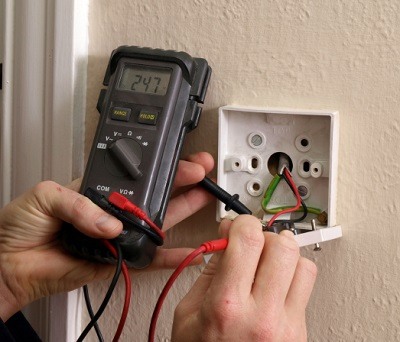Why Do Circuit Breakers Trip?
 When a circuit breaker trips, it cuts off power to parts of your home, which can be very frustrating. To get your power working again, you'll most likely need to go outside, to your garage, or into your basement to switch the breaker back into the "on" position. But if this is happening repeatedly or frequently, then switching that breaker back on might not be advisable.
When a circuit breaker trips, it cuts off power to parts of your home, which can be very frustrating. To get your power working again, you'll most likely need to go outside, to your garage, or into your basement to switch the breaker back into the "on" position. But if this is happening repeatedly or frequently, then switching that breaker back on might not be advisable.
Often, when circuit breakers are tripping, it's a sign that there are more serious problems with your electrical system. Ultimately, tripping circuit breakers can be a warning that there are dangerous problems developing. At Twinson Electric, our electricians are dedicated to helping our clients keep their electrical systems in the safest and most functional condition possible at all times. So before you go to your panel to turn a breaker back, on consider why it might be tripping in the first place, and whether you need to call a professional for electrical repairs.
What Is "Tripping"?
Circuit breakers trip when they detect a problem with the flow of electricity in order stop that flow and prevent circuits from overheating, which could cause tremendous damage. If circuit breakers didn't trip, house fires would be much more common than they are.
There are two common causes of tripping circuit breakers:
- Short circuits
- Overloaded circuits
Here's a quick look at what those mean for you and your Ossining home, and what you can do to prevent further damage:
Circuit Overload
The number one of cause tripping circuit breakers is overloaded circuits. This occurs when you’re asking a particular circuit to provide more electricity to your home that is has the capacity for. When this happens, it causes the circuit to overheat.
If you’re running a computer and a television through the same circuit, using 20 amps of electricity in a circuit that was meant to run 15 amps, the circuit breaker trips to prevent the circuit from possibly overheating and catching fire.
There are a couple of solutions to this problem. The first is to redistribute your devices and keep them off of the same circuits. You could also turn some of the devices off to reduce the electrical load.
Circuit Breakers Tripping Due to Short Circuits
Short circuits are more dangerous than overloaded circuits. They occur when a "hot" wire comes into contact with a "neutral" wire. When this happens, there is a tremendous amount of electrical current flowing, and that creates more heat than the circuit can handle. The circuit trips to prevent damage.
You should be able to easily recognize whether a short circuit has occurred in your Ossining home because a smell of burning will be left around the breaker. You may also find a dark brown or black discoloration around the breaker.
Any of these problems have the potential to become very dangerous if they’re recurring, so if you’re breakers are tripping frequently, it’s worth calling a professional electrician for a safety inspection.




